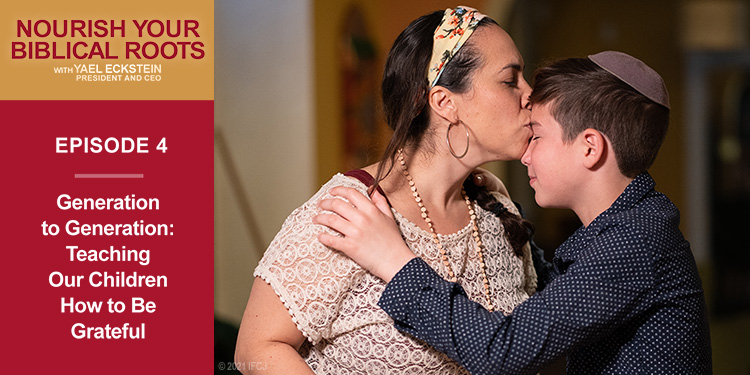Generation to Generation: Teaching Our Children How to Be Grateful

How can we raise children to be grateful when we live in a culture that’s constantly telling us that we need — and deserve — more? It’s not easy, but as host Yael Eckstein explains in this week’s podcast, the key is helping our children recognize all the blessings in their lives. Yael continues her summer series on passing on our faith to the next generation by exploring how the annual observance of Shavuot, better known as Pentecost to Christians, reinforces the principles of gratitude. As Yael explains, Shavuot is about the fruitful times in our lives, when everything is going well, and remembering that God is the source of all our blessings. Discover how the simple habit of recognizing the good can permeate our lives with gratitude. Listen today!
Episode Notes
In the Jewish faith, the principle of gratitude is intricately woven into the holy day known as Shavuot, one of the three pilgrimage festivals mandated in the Bible. In Leviticus 23, the Bible instructs God’s children to observe the holiday of Shavuot seven weeks after Passover. Shavuot, appropriately, means “weeks,” as it marks the conclusion of counting these specified weeks. (In old Greek and Latin, this same festival became known as Pentecost. Pentecost means “fifty days,” and like Shavuot, refers to the passage of time between Passover and the following holiday.)
On this holiday, also called the “Festival of Harvest,” Jews are directed to, “Celebrate the Festival of Harvest with the firstfruits of the crops you sow in your field” (Exodus 23:16). The Hebrew word for “firstfruits” is Bikkurim, which gives the holiday its third biblical name, Yom Bikkurim, the “day of firstfruits” (Numbers 28:26). Bringing to God the firstfruits — meaning the best of the harvest — is a tangible expression of our thankfulness and gratitude.
Since the destruction of the Second Temple in 70 CE, Jews were no longer able to observe this ritual, and Shavuot took on a different significance. Today, Shavuot is observed primarily as the day upon which Israel received the Torah on Mount Sinai 3,000 years ago. According to tradition, God gave the Ten Commandments to Israel on the 6th day of the Hebrew month Sivan, the same day as Shavuot.
Accordingly, the focus of Shavuot today is on Bible study, including the widely held custom to stay up all night long studying the Bible. And while Jews no longer can give God the “firstfruits” literally, they can give God the best they have to offer Him spiritually as a sacrifice of thanksgiving. As Yael Eckstein said, “We give ourselves to God by studying His Word, dedicating our lives to His purposes, and by recognizing that He alone is the source of all blessings.”
Shavuot is about the fruitful times in our lives, when everything is going well, and remembering that God is the source of all our blessings. The antidote to taking God’s blessings for granted or attributing them to our own abilities is gratitude —to recognize God’s gifts and thank Him for them. The practice of giving our first and best to God ensures we acknowledge that it all belongs to Him and that He is the source of all of our blessings.
As Yael explained, “In Hebrew, the word for gratitude is “hakarat hatov,” which literally means “recognizing the good.” Thankfulness begins with awareness — awareness of what we have, of what God has done for us, and of what He continues to do for us each and every day. We can have all of the ‘good’ in the world, but if we are not aware of it, if we do not recognize it, we cannot appreciate it.”
